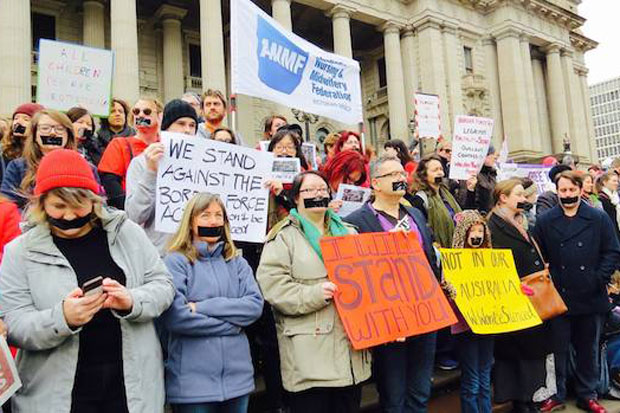Anger at laws that could jail workers for disclosing or recording incidents in immigration detention centres has continued to bubble over, with protests over the weekend and more former staff coming forward to speak out against the new restrictions.
Christine Cummins worked on Christmas Island for close to five years, counselling refugees and asylum seekers suffering trauma on behalf of a government funded health service. It was an experience that left her with stories she has felt the compulsion to share after returning to the mainland.
While under her care, asylum seekers told of late night visits from Serco guards, entering their rooms with a plastic bag and a two minute warning to pack and be ready to leave for Nauru.
“Everyone that I met with was absolutely terrified of being sent to Nauru,” she says.
Families would take turns keeping guard throughout the night, waiting for a visit from the guards.
“The angel of death, they called it.”
Cummins says the conditions in detention exacerbated the combination of posttraumatic stress, anxiety, and depression already suffered by some of the people she met, but that the Department of Immigration was hesitant to move sick detainees off the island.
“They were reactive rather than preventative. It wasn’t unusual to see someone who became psychotic for those reasons,” she says.
She says asylum seekers were returned to detention on the island against the advice of independent psychologists.

Like others who have spoken out about what they saw in Australia’s immigration detention network, Cummins is now angry about a segment of the Australian Border Force Act, passed with bipartisan support earlier this year, which threatens those working on behalf of the Department with two years jail for keeping or releasing “protected information”.
“Those sorts of incidents need to be shared, people need to be aware,” she says.
On Saturday, 250 doctors and health professionals gathered in Sydney, demanding the laws be repealed.
Another rally, outside the Victorian state parliament, drew around 350 people according to organisers.
Sarah Sheppard, a social worker who helped organise the protest over social media, said the new laws took secrecy in detention “a step too far”, and had inspired her and other “amateur activists” to take a stand.
“We were all there as health professionals and teachers, [people]who have a professional and ethical mandate to report abuse. This Border Force Act basically silences that professional mandate,” she said.
The Australian Nursing and Midwifery Federation agree with her.
Despite the ongoing anger, the danger of the laws has been played-down by both Labor and the Coalition, with ALP politicians taking on critics last week and insisting the Act does nothing to undermine existing whistleblower protection laws.
That’s true, but the protections only apply in certain specific situations, including where there has been a previous attempt at internal disclosure met with an inadequate response.
Cummins, who has started a petition calling for a repeal of the Border Force Act’s secrecy provisions, says even if individual cases of abuse are reported internally and responded to by the Department, the public needs to know about the broader conditions in detention centres.
“The impact on children and families, those are the sorts of things that people have no idea about.”
Donate To New Matilda
New Matilda is a small, independent media outlet. We survive through reader contributions, and never losing a lawsuit. If you got something from this article, giving something back helps us to continue speaking truth to power. Every little bit counts.




